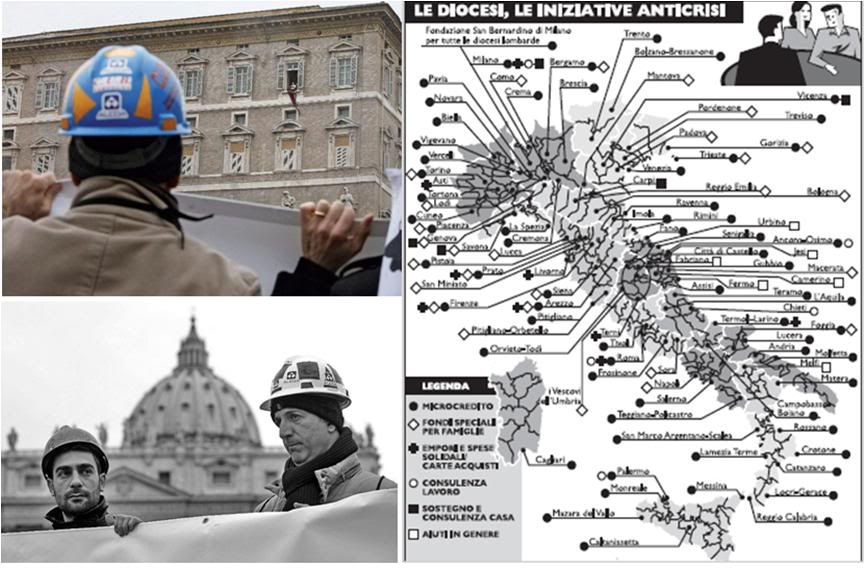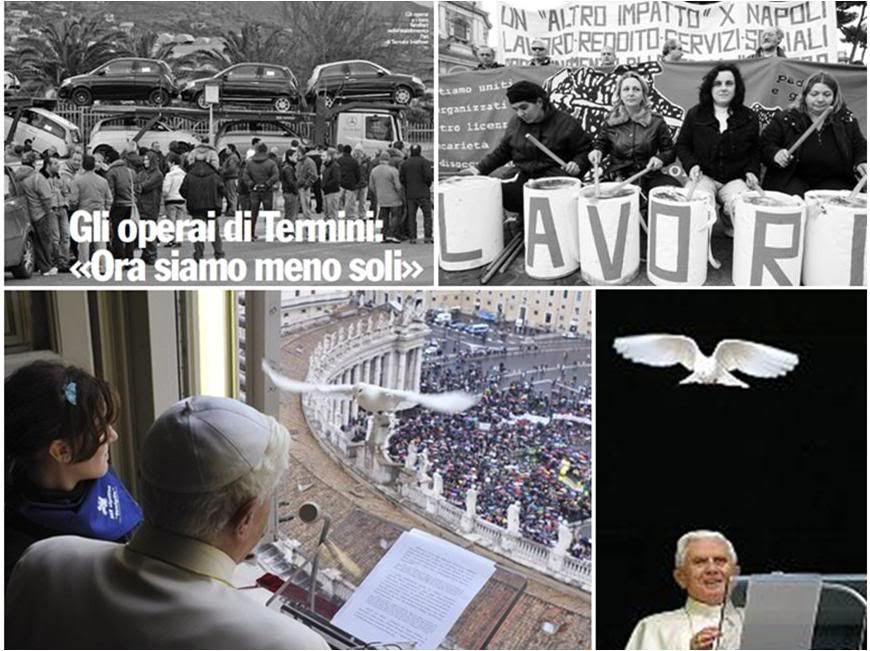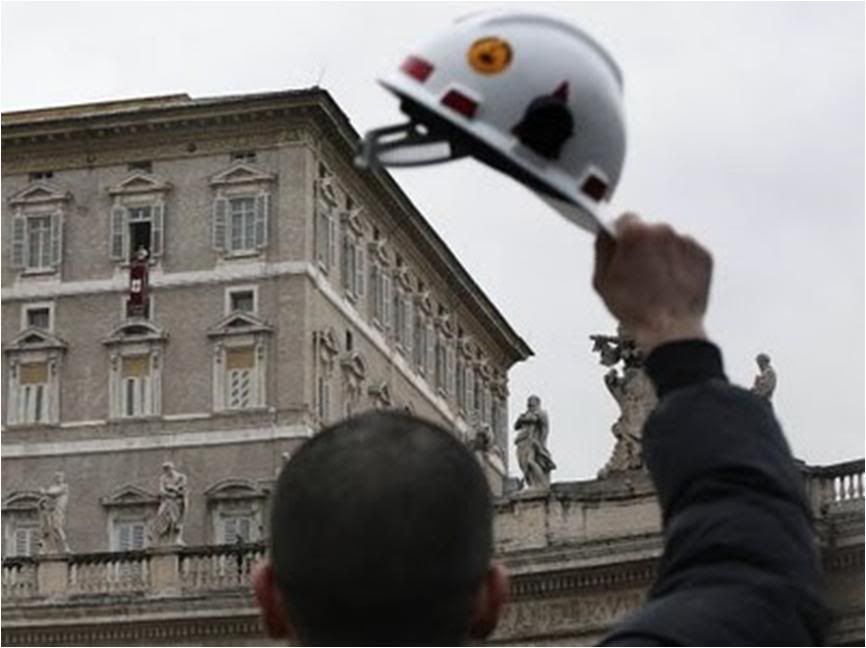
 It is fascinating how Benedict XVI uses his Sunday Angelus messages as a parish priest does with his Sunday homily, except that in his case, he has three parishes to think about - the universal Church, the Church in Italy, and the Church of Rome. Last Sunday, he had multiple message to give on each level... And his appeal in behalf of Italian workers threatened with job loss was properly played up in the Italian media. One headline read: 'Benedict XVI, labor leader'.
It is fascinating how Benedict XVI uses his Sunday Angelus messages as a parish priest does with his Sunday homily, except that in his case, he has three parishes to think about - the universal Church, the Church in Italy, and the Church of Rome. Last Sunday, he had multiple message to give on each level... And his appeal in behalf of Italian workers threatened with job loss was properly played up in the Italian media. One headline read: 'Benedict XVI, labor leader'.
 Workers in endangered Italian industries turned up in St. Peter's last Sunday to seek the Pope's moral support. Right photo, courtesy of Avvenire, shows the extent of the industrial dislocation in Italy due to the economic crisis, and the dioceses mobilized to assist those who are affected.
Benedict XVI, Primate of Italy
Workers in endangered Italian industries turned up in St. Peter's last Sunday to seek the Pope's moral support. Right photo, courtesy of Avvenire, shows the extent of the industrial dislocation in Italy due to the economic crisis, and the dioceses mobilized to assist those who are affected.
Benedict XVI, Primate of Italy
and spokesman for labor:
An impassioned Angelus appeal
in behalf of Italian workers
Editorial
by FRANCESCO RICCARDI
Translated from

February 2, 2010
 Upper left photo, workers in Termini say "Now we feel less alone!"
Upper left photo, workers in Termini say "Now we feel less alone!"
What was most striking in the Pope's appeal last Sunday to protect workers' jobs was his strong emphasis on the responsibility of two enterprises he identified by the names of the places most affected by their planned retrenchments.
The specification goes beyond its mere news value to be a general emblematic symbol for the crisis in Italy today.
Since the global economic crisis began in late 2008, Benedict XVI has spoken out several times for job protection and creation, calling on entrepreneurs and managers to look beyond mere profit considerations.
Why then did he single out the factories in Termini Imerese and Portovesme (sites, respectively of large Fiat and Alcoa plants), when more than 300,000 jobs were lost in 2009 and a few more thousands in danger of losing theirs?
If the Pope felt the urgency of such a specific appeal, coupled with a similar appeal earlier this week by the Italian bishops' conference (CEI), it is probably because he sees in the industrial disputes afflicting those two localities a fundamental illustration of what he advocated in the encyclical
Caritas in veritate: the centrality of man even in the economic process and the social function of business.
It is something that goes far beyond a simple appeal not to close down this plant or that, but involves the sense of why - and therefore how - one does business.
This is not a time for oversimplification, nor for bargaining, such as government incentives for buying cars in return for non-closure of Fiat at Termini Imerese; or further concessions, after already giving discounts for electric costs, in order to keep open Alcoa's aluminum plant in Portovesme.
The problem on hand is, so to speak, meta-economic. In the sense that neither the Pope nor the Church with him can enter into the specifics of economic costs or industrial strategies, which are the competence of industry leaders and local government officials.
Businesses should be able to restructure rather than trust that the crisis can be resolved by simply freezing activity. But precisely because of the social responsibility of entrepreneurs and managers alike, a different interpretation of business in the light of the crisis has become indispensable.
Industry, for instance, can no longer be seen merely as a dispersal of industrial plants wherever land costs less or public incentives are more attractive, and as a simple exchange between capital and labor for as long as the enterprise brings profits.
The enterprise must be seen as a community of men and women rooted to a territory and dedicated to create development and wellbeing for individual members as well as the whole community.
If this is the model of the new capitalism which we should build without ignoring the mechanisms of the market and of free initiative, then the central hinge of action becomes personal and managerial responsibility.
And this starts with the enterprise taking responsibility for the future of those who have worked with it, contributed to its development and its growth and expansion to other places as well.
That is why it seems unacceptable for a multinational giant like Alcoa to leave Sardinia and all the workers dependent on it. That is why it is absolutely necessary to plan new employment and productive prospects for the workers of Termini Imerese - if Fiat truly decides that it can no longer sustain its Sicilian operations on an industrial level.
Perhaps it has decided that it is no longer productive to continue manufacturing the Lancia Ypsilon in Sicily. But could it not think of a diversification or a joint venture, or help finance the birth of a new business through favorable terms using existing personnel and equipment, rather than simply firing its workers?
This would be an exercise of that social responsibility that the Pope specifically referred to. It involves, of course, a definitive change in industrial policy. For instance, is it really for the country's wellbeing and its authentic development to provide incentives for the purchase of cars that are reduced to a bare minimum of features? Cannot the money be better used to finance research and development or production of other goods?
 On the other hand, Luigi Accattoli notes that the Pope had intervened just as directly on behalf of workers in specific industries and localities on two occasions last year. I remember the reference in Cassino when he was visiting there, but the earlier multiple references I do not recall - perhaps because they came during his greetings in Italian, and not as a separate special appeal. But Accattoli's point is very well-taken, and reinforces the impression that Benedict XVI takes concrete and not merely abstract interest in the problems of his Church in Italy.
The Pope and his choice
On the other hand, Luigi Accattoli notes that the Pope had intervened just as directly on behalf of workers in specific industries and localities on two occasions last year. I remember the reference in Cassino when he was visiting there, but the earlier multiple references I do not recall - perhaps because they came during his greetings in Italian, and not as a separate special appeal. But Accattoli's point is very well-taken, and reinforces the impression that Benedict XVI takes concrete and not merely abstract interest in the problems of his Church in Italy.
The Pope and his choice
of the direct approach
by Luigi Accattoli
Translated from

February 1, 2010
For the third time in eleven months, Pope Benedict yesterday cited a Fiat industrial site which threatens to close down - that in Termini Imerese (Sicily). On May 24 last year, he spoke of the 'precariousness' of work for Fiat employees in Cassino, and before that, on March 1, he made an appeal for the 'future' or Fiat workers in Pomigliano d'Arco.
It is difficult to say if the papal appeals will help save all those jobs, but it can be said that the direct appeals, naming industrial sites in crisis, come unhesitatingly from a theologian Pope who prefers not to refer to negaive situations in generic statements, whether he is speaking about the Church or about society in general.
On Sunday, he spoke at the same time of Fiat in Termini Imerese and the multinational (mostly US) company Alcoa and its aluminum operations in Sardinia, showing that he does not hesitate to tackle non-Italian corporations as well. In both cases, he implored that everything possible be done to save the jobs.
We may have become so used to all sorts of appeals that often we do not pay attention to the form in which such appeals are made. But the Pope's appeal on Sunday was not without cost: his words applied pressure on both the government and on the two industrial giants.
In March 2009, he named a number of Italian regions hit by the employment crisis: He greeted "the workers of Fiat from Pomigliano d'Arco" who were present in St. Peter's Square, even as he referred to the threatened loss of jobs "in Sulcis-Iglesiente, Sardinia; Prato in Tuscany; and other centers in Italy".
Certainly, it is not the first time that a Pope refers to industries in crisis. John Paul II did it too.
But the added touch of naming the places and industries affected whenever possible is characteristic of Benedict XVI with the same directness and precision that he deplored, in his letter to Catholic bishops in March last year, the opposition he had met in the Church itself after he lifted the excommunication of the FSSPX bishops.
[Modificato da TERESA BENEDETTA 02/02/2010 20:54]